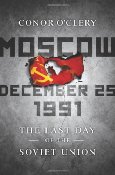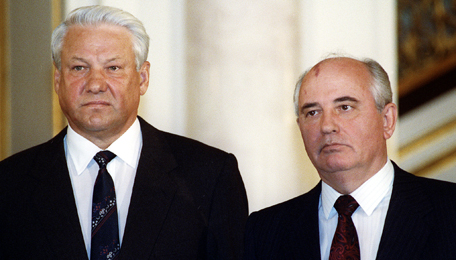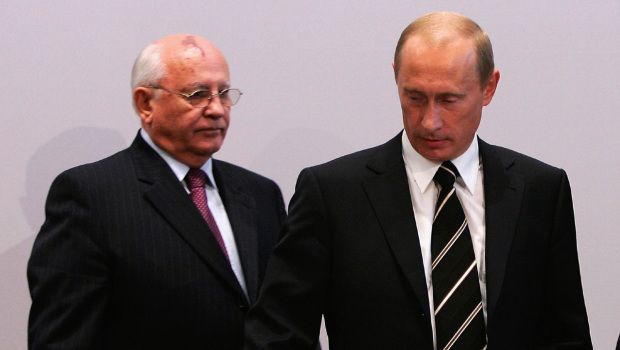
Moscow December 25, 1991 The Last Day of the Soviet Union By Conor O’Clery
As I read Conor O’Clery’s account of the last day of the Soviet Union I kept thinking of the closing lines of TS Elliot’s poem, The Hollow Men.
This is the way the world ends
This is the way the world ends
This is the way the world ends
Not with a bang but a whimper.
 This is the story of the way an empire – The Union of Soviet Socialist Republics – ended. While much of the rest of the world was celebrating Christmas, the Soviet Union quietly slipped beneath the waters of history. After a cynical effort to replace the Union with a federation, the territories over which the USSR claimed dominion floated away, leaving only Russia bobbing in their wake.
This is the story of the way an empire – The Union of Soviet Socialist Republics – ended. While much of the rest of the world was celebrating Christmas, the Soviet Union quietly slipped beneath the waters of history. After a cynical effort to replace the Union with a federation, the territories over which the USSR claimed dominion floated away, leaving only Russia bobbing in their wake.
As the title indicates, this book chronicles the day the Soviet Union died. It begins before dawn on the 25th and, except for the last three chapters that are sort of an epilogue, ends late the same night.
This reader found the author’s organizational scheme somewhat daunting as it requires frequent excursions back to the almost seven years of Mikhail Gorbachev’s tenure as leader of the Soviet Union. At times I had to do some page shuffling to orient myself in time. However, that was a small price for the insights and evocative details conveyed by the author. O’Clery, as Moscow correspondent for the “Irish Times,†witnessed many of the events in the book and meticulously researched the rest.
The author’s story is framed in the rancorous relationship between Mikhail Gorbachev and Boris Yeltsin, the two men responsible for the Soviet Union’s demise. They are a study in opposites. Gorbachev, an ardent communist since his teen years, was given to pontificating and quoting revolutionary poetry at party meetings. Smart, urbane and charming, he became a professional party member and administrator. When sent abroad he met with foreign leaders and impressed them with his intelligence and sophistication.
Yeltsin was born in a poor village in Western Siberia. He did not join the party until he was 30 and then only did so to further his career. His organizational skills and force of character propelled him through party ranks. He was vain, cunning, voluble, often crude, drank to excess and was given to outbursts of temper.
Yeltsin thought Gorbachev patronizing and egotistical. Gorbachev considered Yeltsin a crude, ambitious peasant.

Despite misgivings, Gorbachev recognized Yeltsin’s unique talents and advanced his career, first by bringing him to Moscow to head the Central Committee’s construction department and then by making him first secretary of Moscow with orders to clean up the corruption and get things working.
The country was in a perilous state when Gorbachev became president in 1985. Living conditions in the cities were barely tolerable and the rural population lived in poverty and misery. Less than a year after becoming president he told the Twenty-seventh Party Congress that the corruption and inertia that characterized life in the Soviet Union must end.
He announced that fundamental reforms were needed. He called for glasnost, a new openness, and an end to censorship. He promised that with perestroika (reform) living conditions would improve and consumer goods would become more plentiful. He also said that meddling in other countries’ affairs and confrontations with the West must stop.
The economic system was crumbling; continuous shortages of everything from shoes to soap plagued daily life. Things had to change. Even the room full of aging communist leaders knew that.
Gorbachev wanted to preserve, modernize, and reform the Soviet Union. He envisioned a market-driven socialism. Glasnost and perestroika were intended to mend a broken system, not destroy it.
Yeltsin had a different idea. “Visiting America for the first time turned out to be a life-changing experience for Yeltsin, revealing to him the human potential and dynamism of a different ideology.” Realizing that he had been “told fables†his entire life, “his belief in the Bolshevik idea was destroyed.†Yeltsin was determined to eradicate the old system and build a capitalist Russia on its ashes. But he had no understanding of how a market economy works. The effort destroyed him.
Gorbachev could not deliver on his promises, either. Living conditions continued to deteriorate. Even partially removing the constraints that bound a people for 70 years did not produce innovation and creativity, but lawlessness and confusion.
This reviewer visited the Soviet Union in 1986 and again in 1990. The differences were striking. In 1986 the shortage of consumer goods was evident in the long lines in front of the few shops that had something to sell. However, I went out alone at night without fear. The penalties for mugging a tourist were severe. Although there were few taxis, I soon learned that those fortunate to have an automobile were more than happy to provide a ride for a few packs of American cigarettes, which could be sold on the black market.
In 1990, it was quite different. Clerks who were dismissive in 1986 were surly. Hotels were even seedier. The shops were emptier and the lines were longer. The poor and homeless were more evident. Few Soviets had anything good to say about Gorbachev or his “reforms.†I was told not to wander around by myself after dark.
Ironically when hard-line communists conspired to overthrow Gorbachev in August of 1991, it was Yeltsin who saved the day, earning popularity that Gorbachev never achieved in his own country, although he was much admired in foreign capitols.
The four months after the August coup were filled with shifting alliances, betrayals and double-dealing as Yeltsin out maneuvered Gorbachev, fractured the Union and set in motion the events that would make him ruler of Russia.
O’Clery’s riveting history reveals what happened on the historic day the Soviet Union disappeared and Gorbachev reluctantly surrendered power to Yeltsin. Yeltsin appears boorish and petty. Gorbachev is exposed as only a partial believer in his own rhetoric. Having long denied the existence of files pertaining to the Katyn massacre and the Hitler-Stalin pact, they are discovered in a safe in his office.
Yet, between the two of them they dissolved an empire, outlawed the Communist Party, and installed free elections for the first time in that benighted land’s history.
The author writes:
… [T]he malevolence of Yeltsin and the vanity of Gorbachev do not stand in the way of something akin to a political miracle taking place. On December 25, 1991, a historical event on a par with the fall of the Austro-Hungarian Empire in 1918 or the collapse of the Ottoman Empire in 1923 occurs without a foreign war or a bloody revolution as catalyst. …The Soviet Union breaks up almost impassively as the world looks on in disbelief. The mighty Soviet Army relinquishes an empire of subject republics without firing a shot. It all happens very quickly. Few politicians or scholars predicted, even as the year 1991 began, the scale and scope of the historic upheaval at year’s end.
Historically, Russian rulers held a monopoly of political power long after other European countries introduced parliamentary government. With no democratic political tradition to draw upon and lacking experience with the rule of law – law being whatever the Party said it was at a given time–the transition to Western style democracy still seems problematic.
For Mikhail Gorbachev, who turned 80 on March 2, 2011, the nightmare for Russia is far from over. He protests that Russian leaders are steadily rolling back the democratic achievements of his time and that the first and only free, competitive, and honest elections were those he initiated before the end of 1991. He observes that there are still many people in society who fear democracy and prefer authoritarian stability.
Gorbachev’s first Prime Minister, cited by Martin in his review of Leon Aron’s book – Roads To The Temple, explained the spiritual and moral consequences of the Soviet system:
…. Nothing was done with any care … [We] stole from ourselves, took and gave bribes, lied in the reports, in the newspapers, from high podiums, wallowed in our lies, hung medals on one another. And all of this — from top to bottom and bottom to top.
Seventy years of daily life controlled by government produced dependence, lawlessness, an under-developed work ethic … and hollow men.

 The posts are coming!
The posts are coming!


2 comments
And for more on this story is: http://mises.org/daily/6210/Dancing-on-the-Grave-of-Keynesianism
[Reply]
Thanks, Jeff. North does a great job of nailing the Keynesians.
[Reply]
Leave a Comment